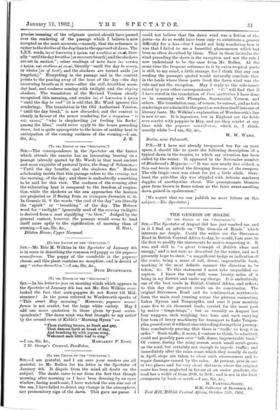(TO THE EDITOR OF THE "SPECTATOR. ") Snt,—I am grateful, and
I am sure your readers are all grateful, to Mr. Bullen for his letter in the Spectator of January 4th. It dispels from the mind all doubt on the subject. The doubt came to me from the fact that though morning after morning as I have been dressing by an open window, facing south-east, I have watched the sun rise out of the sea, I have failed to detect any change in the atmosphere, any premonitory sign of the dawn. This gave me pause. I could not believe that the dawn wind was a fiction of the poets—to do so would have been only to substitute a greater difficulty for a less—but I could not help wondering how it was that I failed to see a beautiful phenomenon which had been so often described by them. That in these latitudes the wind preceding the dawn is the exception and not the rule I now understand to be the case from Mr. Bullen. At the same time the frequent reference to it by extra-tropical poets is still, to my mind, a little strange, for I think that any one reading the passages quoted would naturally conclude that in the lands where these poets lived the dawn wind was the rule and not the exception. May I reply to the side-issues raised by your other correspondents ? " C." will find that if I have erred in the translation of i'ora mattutina I have done so in company with Plumptre, Scartazzini, Vernon, and others. His translation may, of course, be correct, and as both renderings are admissible the question resolves itself into one'of literary taste. Mr. Wilkins's explanation of Wordsworth's line is new to me. It is ingenious, but in England are the fields ever scarlet with poppies in May, and are they scarlet at any time with the papaver somniferum, which is, I think. usually white P—I am, Sir, &c.,
W. W. WARD. Bosloe, near Falmouth.
P.S.—If I have not already trespassed too far on your space, I should like to quote the following description of a typical dawn in the tropics, to which my attention has been called by the writer. It appeared in the November number of Blackwood's Magazine :—" It was now nearly five o'clock, a thin cool breeze stirred the drooping festoons of the creepers. The vile tropic crow was silent for yet a little while. Over- head the pale-blue sky was stippled with delicate • mackerel dapples of amethystine cloud. The pomegranate blossom grew from brown to flame colour as the faint sweet-smelling dawn gained in opalescence."
[We regret that we can publish no more letters on this subject.—En. Spectator.]






































 Previous page
Previous page